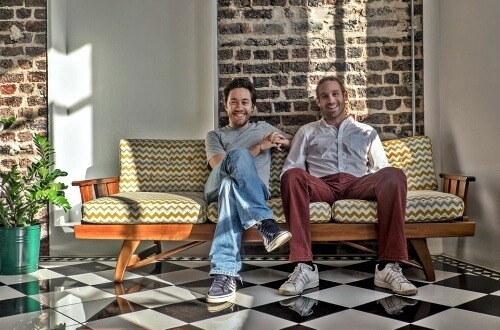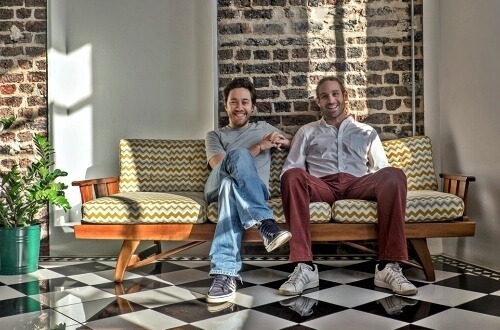
A long-standing partnership with Pep, the biggest single brand retailer in Africa with more than 2 000 retail stores in Southern Africa, allowed Mama Money, a young Cape Town-based fintech startup, to gain access to Pep’s extensive network of stores, helping to drive the startup’s expansion further into Africa.
Mama Money is a mobile money transfer service catering to Africa’s largely unbanked market and migrant population.
Founded by Raphael Grojnowski and Mathieu Coquillon, Mama Money enables users to send money at a fee of 5% where standard money transfer costs are around 12%. There are also no hidden costs and no margin charged on the exchange rate, says Grojnowski.
The partnership means migrant workers wishing to send money home are now able to walk into any Pep Store and have the money delivered to their families in another country by the time they walk out without the exorbitantly high costs of traditional money transfer services.
The startup now has a footprint in other African countries due to this expansion, including Zimbabwe, Mozambique, Tanzania, Ghana, Kenya and Nigeria.
Pep, however, is not the only strategic partnership that Mama Money has made in an effort to get their services to the masses. More recent partnerships in South Africa include Checkers, Boxers, Ackermans, Pick ‘n Pay, Spar and Shoprite.
In Nigeria, one of the biggest markets in Africa, Mama Money is connected to the 25 biggest banks and a mobile wallet, VKash. In Ghana, they are working with mobile money transfer and payments service, MTN Mobile Money and mobile commerce platform, Airtel Money. In Tanzania, Mama Money’s launch partners are mobile money transfer services, Vodacom M-Pesa, EzyPesa and Airtel Money.
Making Sending Money As Easy As Pie
With an estimated 2.5 billion people in developing countries who lack access to banking services, results from the FinScope South Africa 2016 Survey reveal that in South Africa about 7.9 million adults are sending money to about 12.7 million recipients. The study also revealed that about 32% of adults are remitting via supermarket money transfer counters, whereas 22% are remitting via cellphone based applications.
This is exactly where Mama Money is hoping to make an impact.
Users are able to register through a Mama Money agent or on the website. To send money they create an order on their mobile phones and are then able to make a payment electronically or via cash at any of their partner stores. The funds are then transferred to the recipient’s mobile wallet account immediately.
Not only is the fintech startup making significant strides in the area of financial inclusion, they have tapped into a problem with a potentially huge market with scope to scale, says Dominique Collett, senior investment executive at Rand Merchant Investments (RMI) and head of AlphaCode, a club for fintech startup entrepreneurs run by RMI.
“Mama Money’s rapid expansion is testament to its ability to service a fundamental need of migrant workers in South Africa. It has a real impact on real people’s lives,” she says in a statement by the startup.
SME South Africa speaks with Grojnowski about how partnerships helped Mama Money gain traction in a competitive yet largely untapped market and the value of turning potential competitors into collaborators.
Mama Money Chooses Partners That Our Customers Can Trust
We’re now live in South Africa, with Zimbabwe as our host corridor, also in Malawi, Tanzania, Kenya, Ghana and Nigeria and in most cases we are live with mobile wallets and banks. And the partnerships work best if the mobile wallet or the banks on the receiving side are very strong. So the reason we use mobile wallets and banks is because they have a good name recognition.
So the choices are made based on command by senders and recipients. We have partnerships like that because we want to be a low-cost operator and we want to help people send money home for less and the way to do that is by getting rid of cash as much as possible and focusing on the electronic payment system.
We Work To Get Even Remote People Into The Fold
On the receiving side I feel the mobile wallets are making tremendous strides in going into previously untapped markets, so for example M-Pesa in Kenya and Tanzania is amazing, Airtel is really great.
So, the mobile networks and the mobile money operators, work very hard to bring people that are remote into the fold. It gives people access to those basic financial services to be able to keep money safe without the need for cash. This is what we are [leveraging on].
Our Best Marketing Tool Is Making Sure We Have The Best Product
It helps if you have a really good product. So the best way to market your product is by having a good one. So we focused, especially early on, on reliability, and obviously cost. Those are really the factors that make our product great.
We also have a really strong social media presence. Nowadays everybody, even the under-banked are on social media. Everybody has Facebook, a lot of people are on Twitter, a lot of people are on Instagram – so we’re very active on the social media front.
And also we have a very strong agent network. We have agents from the local communities that registered users. So we’re very much a ‘from the root up’ company. We focus a lot on having people from the community help each other to send money home and thereby save money. So I think the agent network is definitely the engine room of Mama Money and on other side we provide entrepreneurial options for them because they are self-employed and working for themselves.
Lowering Costs Is The Reason Mama Money Exist
We work closely with the mobile wallets. They are big fans of ours because the more money runs in the ecosystem the better. So we are getting a lot of support from Vodacom and Airtel and other partners because they ultimately know that the more people use their wallets the better for them. We see it in the same way, the more people use their wallets the better for us. What we are trying to achieve is to bring these huge transaction costs that exist in Africa we’re bringing them down.
So our goal is, for example South Africa, from having some of the highest transactional costs in the world to having the lowest in the world in a few years. If you look at the background of why Mama Money exists is that it is unbelievably expensive to send lower-valued money transfers out. So if you think about people who earn maybe five or six thousand Rands and send a third of that home. And to pay all those fees, maybe 15 to 20 percent, for a relatively little transaction, in my opinion it’s extortion.
Pace Is The One Big Challenge With Partnerships
In general, the bigger the partner, the longer everything takes. We like to provide really good service to our customers and we have found that large operators because of their size take a long time. But the way we see it is once the ship is going in the right direction, it’s going to sail forever.






